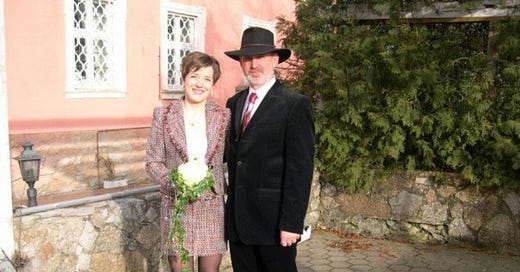Summer 2002
I’ve been single for a-year-and-a-half now, and I hate it. The stench of loneliness is wafting off me like the stink of stale sweat, making every man I’m interested in turn around and run the other way. I’ve lost my sense of style, my girlish figure, my positivity. I don’t even have a decent haircut; my overprocessed hair hangs limp and shapeless around my round face. I feel like the ugliest, most unlovable person in the world.
And then I meet him. He doesn’t run the other way. He looks at me like I’m the most beautiful woman he’s ever seen in his life. After three days together, he tells me he loves me.
Two months later, he flies all the way from Canada to Germany to see me. To see me! We spent two magical weeks together where we fall head-over-heels in love with each other. I’ve never felt like this before. He says he’s never felt like this before. We decide to give this thing a real try: we’ll have to implode our individual worlds to be together, but we can’t not try. We simply can’t.
I have two months before I’ll leave my old life and start my new one in a new country with him by my side. It’s not a lot of time to overhaul myself, so I spring into action. I drastically reduce my calorie intake and start running. He may have fallen in love with me the way I look now, but I can be so much better if I put some effort in! He deserves the best version of myself. I go to bed hungry every night, trying to soothe my growling stomach with visions of his admiring glances at my newly svelte figure.
Since I’m about to drop out of college anyway I stop going and take a second job. I make as much money as I possibly can, and buy myself a brand new wardrobe for my shrinking body.
I had just turned twenty-three when I moved to Canada to be with the man who would become my husband. He was working, so it was obvious to me that I was going to keep house. I instantly became a stepmother of four, and while I couldn’t cook, I was determined to learn with the help of the two cookbooks the women in my family had given me as a dowry of sorts—one a gift from my grandma, the other one from my mom.
The first thing Rich bought me was an iron and ironing board. That wasn’t weird to me at all; I’d been ironing my family’s clothes for years, and it was a given to me that I would be ironing his now.
Both Rich and I grew up in three-generational households. The women in our homes worked plus did everything at home—and I mean everything. Cooking, cleaning, raising the kids, being in charge of all medical appointments, school stuff, after-school activities, remembering birthdays, buying cards and gifts for the required occasions, clothing the men, making the appointments for their haircuts, looking after their physical and emotional needs—and yes, ironing their shirts and, in the case of one overzealous member of my family, even their underwear.
The men worked hard, all of them, and they looked after the cars and unplugged the toilets if needed. Still, the women had three fulltime jobs, all of them needing daily attention, because families need to be fed daily, dust keeps collecting, and children are needy little creatures. But isn’t that what we women wanted? Wasn’t that equality?
If one of them lost her temper and yelled or slammed some doors because she was exhausted and fed up, while also bleeding profusely and having pain rivaling a heart attack for several days every damn month—who could blame her?
Making jokes belittling our periods didn’t help.
In 2004, I left; both Rich and Canada. We had reached an impasse in our relationship: he didn’t want to pay for me anymore, dealing with his own issues from his divorce. I didn’t want that either, but I couldn’t get a job because I didn’t have a work visa. The $4,000.00 I had arrived with a year earlier were gone. Not knowing how to get my paperwork approved and unwilling to admit that he didn’t know what to do next, he would always change the subject whenever I brought it up. I was frustrated at being depended on a man, and furious that he refused to figure out a solution together.
So I got myself a job in Wales, UK, and left after having lived with him for eighteen months.
I was heartbroken, but clear-eyed. At twenty-four, I had plenty of time to start over.
My leaving was the wake-up call he needed. We reconciled while I was working in Wales, and six months later, on January 10, 2005, we got married.
I was happy. Our love had never been the problem—it was the external circumstances, the difficulty of getting established in a new country, being the newbie in a ready-made family. We easily fell back into the roles we’d inhabited before: Rich worked and took care of his animals, I did the rest; but this time, I was also working, and soon, I was going to school full-time.
School, part-time job, wife, stepmom, keeper of the house, provider of meals, shopper of groceries, an undiagnosed mental health condition—no wonder I continued the family tradition of yelling and slamming doors. Years later, when I pressed my therapist to tell me the reason for my depression—was it a chemical imbalance? Hereditary? My own fault?—she looked at me thoughtfully. “Genetics can certainly play a role, as can hormones. But I think part of the reason is that you, like most women, have been conditioned to constantly give to others without receiving much in return. You’re burnt out.”
She called it Human Giver Syndrome, and the more I thought about it, the more it made sense.
Paris Paloma sings in her feminist anthem Labour:
“All day, every day, therapist, mother, maid
Nymph then a virgin, nurse then a servant
Just an appendage, live to attend him
So that he never lifts a finger
24∕7, baby machine
So he can live out his picket fence dreams
It's not an act of love if you make her
You make me do too much labour.”
“Women can have it all” has been insidiously translated into “women should do it all”.
That’s what my grandmother did, who passed it down to my mother, who passed it down to me. For a long time, I didn’t question it. It was my normal; the price women paid for having reached equality and becoming independent.
My husband grew up in the same system, but when he was born it was a lot more extreme: the civil rights movement hadn’t started yet, birth control pills didn’t exist, and it would be another twenty years before women were allowed to have their own credit cards. By the time he was a teenager, the second wave of feminism was in full swing, something he full-heartedly supported. Rich believes in women’s rights and has never meant to treat women any different from men.
But you don’t know what you don’t know, and he was as blind and deaf to the many inequalities between men and women as I was. They do exist though, and once you see them, you can’t un-see them:
50% of the population is female, yet they make up only 28% of the US congress, 30% in Canada.
Out of the 47 US presidents, none have been female; out of the 23 prime ministers in Canada, only one was female.
Women are blamed for their own sexual assaults: what was she wearing? Why was she out that late at night? Was she drunk? Did she lead him on? What did she expect would happen after he took her out to dinner?
Conversely, women that are deemed not to be conventionally attractive are often not believed at all. Who would rape someone like her?
Being on the streets isn’t the most dangerous place for women to be though; statisticially, it is our home. The majority of female homicide victims are killed by their partner or family members.
Globally, women hold 5.6% of CEO positions in the Global 500; it’s 10.4% of Fortune 500 companies.
The gender wage gap is blamed on women for choosing lower paying jobs. But if they decide to pursue leadership positions, they are blamed for the disintegrating family structure of society, not to mention being labelled bossy, aggressive, a bitch, or having “slept her way to the top”.
Single mothers are societally looked down on, even though they are the parent who stayed.
The idea of teenage lolitas seducing innocent older men who can’t help themselves is so powerful that young—or underage!—women are crucified by public opinion for “ruining” successful, powerful men’s careers. How can a child “seduce” a grown man? It’s the other way around, always.
Don’t even get me started on reproductive rights. Having autonomy over one’s own body should be a basic human right—and yet, it only is for straight, white men.
Women are blamed for not having kids, having only one kid, having too many kids; for starting too young, waiting too long, quitting their job to raise their children, for continuing to work while having children; and when it comes to raising them, they won’t do anything right.
Women aren’t allowed to age. They’re ridiculed for trying too hard, but also for not trying hard enough; for getting work done, but also for “letting themselves go”; for caring too much, but also for caring too little about their appearance; for being too fat, too skinny, too curvy, not curvy enough.
The diet industry was worth USD 19.34 billion in 2024 and is anticipated to reach USD 60.48 billion by 2030. While they now also target men, its primary focus has always been women, and now they’re aggressively targeting children as well. By creating different trends for the desired body shape), they can get money out of the same women year after year for their entire lives.
Also, to quote Naomi Wolf again: “Dieting is the most potent political sedative in women's history; a quietly mad population is a tractable one.” Don’t let them manipulate you.“Women's bodies and identities are taken away from them and sold back to them every day.” (source: texasgardenfairy via Feminist).
The patriarchy successfully sold women the narrative that they can’t trust each other, because other women are competition. They created the myth that there’s a limited amount of resources women have to fight over. Meanwhile, the men have their old boy’s club that they can call upon to protect themselves against little inconveniences like accusations of rape, paternity claims, or “youthful indiscretions” of their sons.
I went through a phase of fury, embarrassment, and anger. Fury at the unfairness of it all, embarrassment for not having recognized it sooner, and anger at men. How could they do this/not see this/endorse this?
I was also deeply ashamed for having participated in it myself. I had done the victim-blaming, bought into the narrative that women sometimes “brought it on to themselves”, applied a double-standard because I was taught that women’s fragility or emotionality made them less suitable for roles of greater responsibility. I believed that enduring pain quietly was every woman’s duty, and that complaining about it made us look weak.
I fell for the weaponized incompetence men use when it comes to work they don’t want to do, agreeing with the misconception that women were “better” at housework and childcare.
Last but not least: I, too thought that feminist was a dirty word. I swallowed unquestioninly its negative connotation that feminists were rejected women who hated men.
The definition of feminism is much simpler: all we want is equality and the same rights. That’s it.
After a while, the embarrassment went away. It doesn’t serve the person experiencing it, so it’s best not to hang on to it for too long. I also shifted my anger away from men and onto the system.
Here’s the thing: I like men, and I love my husband. I also don’t believe that hate achieves anything. Besides, while (straight, white) men are lesser victims of the patriarchy, they are victims nonetheless: a rigid expectation of “manly” behaviour (suppressing emotions, lack of physical intimacy with other men, cruelty, being socially aggressive) leads to poorer health outcomes, relationships with others, and self-image. Even more importantly, everybody suffers when the strengths of half of its population—intuition, empathy, communication, social awareness—are poorly valued or disregarded completely.
I woke up once I stopped drinking, which incidentally is also a potent political sedative. An inebriated population is easily manipulated.
My husband and I celebrated our twentieth wedding anniversary last week. We are happier in our marriage than ever before, and it’s not despite me having become a feminist, but because of it. Nothing is better for a healthy relationship than having the support of an empowered partner. We are true equals who don’t take each other for granted. In a relationship like that, no partner has to hide their true selves. They can show their fears, emotions, weaknesses, and shadow selves. Because we know that we won’t be met with ridicule or derisiveness, but with love, respect, and support.
I’ll close this with a few thought-provoking quotes from one of my all-time favourite feminists Farida:
“Women are overworked not because feminism gave women the right to work outside the house. But because patriarchy gave men the privilege to not work inside the house.”
“A man who fears being seen as feminine is a man who fears being treated the way he treats women.”
“We teach boys not to dress, play, speak like girls; and we teach girls not to dress, play, speak as they like. We end up in a world where boys are afraid of being like girls, and girls are afraid of being themselves. The fear of “girl” is instilled in all of us. Dismantle that fear; and you dismantle patriarchy.”














What is it with German girls having to iron the laundry for their whole family?!? I had to do that too, from the time I was 12! I think our best chance of survival is a matriarchy, certainly *not* the patriarchy. I don’t want to do everything a man does, but I want to do what I want to do without any restrictions - whether it’s considered “female” or “male”. Don’t even get me started on the banking industry and credit ratings and credit card limits - there are not many industries more deeply sexist.
“The idea of teenage lolitas seducing innocent older men who can’t help themselves is so powerful that young—or underage!—women are crucified by public opinion for “ruining” successful, powerful men’s careers. How can a child “seduce” a grown man? It’s the other way around, always.” Say it louder for the people in the back! 👏🏼👏🏼👏🏼